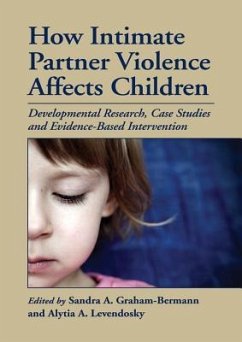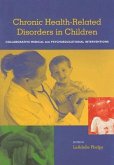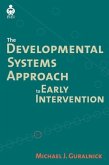Sandra A. Graham-Bermann
How Intimate Partner Violence Affects Children: Developmental Research, Case Studies, and Evidence-Based Intervention
Sandra A. Graham-Bermann
How Intimate Partner Violence Affects Children: Developmental Research, Case Studies, and Evidence-Based Intervention
- Gebundenes Buch
- Merkliste
- Auf die Merkliste
- Bewerten Bewerten
- Teilen
- Produkt teilen
- Produkterinnerung
- Produkterinnerung
Using a developmental framework, this book presents research on how exposure to intimate partner violence affects children and how clinicians can treat these children.
Andere Kunden interessierten sich auch für
![Intimate Partner Violence Intimate Partner Violence]() Intimate Partner Violence89,99 €
Intimate Partner Violence89,99 €![Working with Parents of Noncompliant Children: A Guide to Evidence-Based Parent Training for Practitioners and Students Working with Parents of Noncompliant Children: A Guide to Evidence-Based Parent Training for Practitioners and Students]() Mark D. ShriverWorking with Parents of Noncompliant Children: A Guide to Evidence-Based Parent Training for Practitioners and Students31,99 €
Mark D. ShriverWorking with Parents of Noncompliant Children: A Guide to Evidence-Based Parent Training for Practitioners and Students31,99 €![Chronic Health Related Disorders in Children: Collabroative Medical and Psychoeducational Interventions Chronic Health Related Disorders in Children: Collabroative Medical and Psychoeducational Interventions]() LeAdelle PhelpsChronic Health Related Disorders in Children: Collabroative Medical and Psychoeducational Interventions25,99 €
LeAdelle PhelpsChronic Health Related Disorders in Children: Collabroative Medical and Psychoeducational Interventions25,99 €![The Transmission of Depression in Families and Children: Assessment and Intervention The Transmission of Depression in Families and Children: Assessment and Intervention]() The Transmission of Depression in Families and Children: Assessment and Intervention146,99 €
The Transmission of Depression in Families and Children: Assessment and Intervention146,99 €![Lectures on Diseases of Children: a Handbook for Physicians and Students Lectures on Diseases of Children: a Handbook for Physicians and Students]() Lectures on Diseases of Children: a Handbook for Physicians and Students41,99 €
Lectures on Diseases of Children: a Handbook for Physicians and Students41,99 €![The Diseases of Children: Digestive System, Respiratory System, Circulatory System, Thyroid Gland The Diseases of Children: Digestive System, Respiratory System, Circulatory System, Thyroid Gland]() Meinhard Von PfaundlerThe Diseases of Children: Digestive System, Respiratory System, Circulatory System, Thyroid Gland46,99 €
Meinhard Von PfaundlerThe Diseases of Children: Digestive System, Respiratory System, Circulatory System, Thyroid Gland46,99 €![The Developmental Systems Approach to Early Intervention The Developmental Systems Approach to Early Intervention]() The Developmental Systems Approach to Early Intervention66,99 €
The Developmental Systems Approach to Early Intervention66,99 €-
-
-
Using a developmental framework, this book presents research on how exposure to intimate partner violence affects children and how clinicians can treat these children.
Hinweis: Dieser Artikel kann nur an eine deutsche Lieferadresse ausgeliefert werden.
Hinweis: Dieser Artikel kann nur an eine deutsche Lieferadresse ausgeliefert werden.
Produktdetails
- Produktdetails
- Verlag: American Psychological Association (APA)
- Seitenzahl: 314
- Erscheinungstermin: Februar 2011
- Englisch
- Abmessung: 259mm x 186mm x 24mm
- Gewicht: 721g
- ISBN-13: 9781433809309
- ISBN-10: 1433809303
- Artikelnr.: 32547037
- Herstellerkennzeichnung
- Produktsicherheitsverantwortliche/r
- Europaallee 1
- 36244 Bad Hersfeld
- gpsr@libri.de
- Verlag: American Psychological Association (APA)
- Seitenzahl: 314
- Erscheinungstermin: Februar 2011
- Englisch
- Abmessung: 259mm x 186mm x 24mm
- Gewicht: 721g
- ISBN-13: 9781433809309
- ISBN-10: 1433809303
- Artikelnr.: 32547037
- Herstellerkennzeichnung
- Produktsicherheitsverantwortliche/r
- Europaallee 1
- 36244 Bad Hersfeld
- gpsr@libri.de
Sandra A. Graham-Bermann, PhD, is a professor of psychology and psychiatry at the University of Michigan, Ann Arbor, where she has been researching the ways in which different forms of violence affect children's adjustment, including their traumatic stress reactions and resilient coping. She has studied children ages 3 to 13 in a variety of contexts, such as preschools, community settings, and shelters for abused women. As part of this program of research, she has developed new measures of children's fears and worries, their symptoms of traumatic stress, attitudes and beliefs about violence, family stereotyping, and conflicts in sibling relationships. With support from the Centers for Disease Control and Prevention, the Department of Health and Human Services, and state and local foundations, she has studied multiple forms of violence in the lives of children and designed and evaluated interventions for women and children exposed to domestic violence. These programs have been adopted for use in five countries and 27 states. Dr. Graham-Bermann is author of more than 50 research journal articles, and she is coeditor with Jeff Edleson of Domestic Violence in the Lives of Children: The Future of Research, Intervention, and Social Policy (2001). Alytia A. Levendosky, PhD, is a professor of psychology and director of clinical training at Michigan State University, East Lansing, where she studies the intergenerational transmission of violence, specifically focusing on the prenatal effects of intimate partner violence. The goal of her research program is to develop a comprehensive model of the psychological, physiological, and neurological mechanisms through which prenatal exposure to intimate partner violence affects the mother–child relationship and children's developmental outcomes. With colleagues at Michigan State University, she has followed a cohort of 200 children from pregnancy through age 10. Her research has led to an understanding of the mother–child attachment relationship in the context of intimate partner violence. She has received support for her research from the National Institute of Justice, the Centers for Disease Control and Prevention, the National Institute of Mental Health, and the National Institute for Child Health and Development. She is author of more than 45 research journal articles, and this is her first book.
Contributors
Acknowledgments
1. Introduction
Sandra A. Graham-Bermann and Alytia A. Levendosky
I. Prenatal to Infancy
1. Effects of Intimate Partner Violence on the Attachment Relationship
Between Mother and Child: Data From a Longitudinal Study Beginning
During Pregnancy
G. Anne Bogat, Alytia A. Levendosky, Alexander von Eye, and William
S. Davidson II
2. Perinatal Child–Parent Psychotherapy: Adaptation of an Evidence-Based
Treatment for Pregnant Women and Babies Exposed to Intimate Partner
Violence
Alicia F. Lieberman, Manuela A. Diaz, and Patricia Van Horn
3. Infant–Parent Relationship Disturbance in the Context of Intimate
Partner Violence: A Clinical Case Study of James
Alissa C. Huth-Bocks, Lauren Earls, and Jessica Latack
II. Toddler to Early Childhood
1. The Multiple Impacts of Intimate Partner Violence on Preschool
Children
Kathryn H. Howell and Sandra A. Graham-Bermann
2. Interventions for Young Children Exposed to Intimate Partner
Violence
Renee McDonald, Ernest N. Jouriles, and Laura C. Minze
3. A Clinical Case Study of Chris: A Young Child Exposed to Intimate
Partner Violence
Tova B. Neugut and Laura E. Miller
III. School-Age Children
1. The Effects of Intimate Partner Violence on School-Aged Children
Renee L. DeBoard-Lucas and John H. Grych
2. Evidence-Based Practices for School-Age Children Exposed to Intimate
Partner Violence and Evaluation of the Kids' Club Program
Sandra A. Graham-Bermann
3. Intimate Partner Violence in the School-Age Years: A Case Study of
the Evaluation of Alia, a Multiply Abused Girl
Alytia A. Levendosky and Sandra A. Graham-Bermann
IV. Adolescents
1. The Impact of Intimate Partner Violence on Adolescents
Laura Ann McCloskey
2. The Adolescent's Experience of Intimate Partner Violence and
Implications for Intervention
Alison Cunningham and Linda L. Baker
3. A Clinical Case Study of Caden, an Adolescent Boy Exposed to Intimate
Partner Violence
Alytia A. Levendosky
Epilogue: Conclusions and Challenges
Alytia A. Levendosky and Sandra A. Graham-Bermann
Appendix: Discussion Questions
Index
About the Editors
Acknowledgments
1. Introduction
Sandra A. Graham-Bermann and Alytia A. Levendosky
I. Prenatal to Infancy
1. Effects of Intimate Partner Violence on the Attachment Relationship
Between Mother and Child: Data From a Longitudinal Study Beginning
During Pregnancy
G. Anne Bogat, Alytia A. Levendosky, Alexander von Eye, and William
S. Davidson II
2. Perinatal Child–Parent Psychotherapy: Adaptation of an Evidence-Based
Treatment for Pregnant Women and Babies Exposed to Intimate Partner
Violence
Alicia F. Lieberman, Manuela A. Diaz, and Patricia Van Horn
3. Infant–Parent Relationship Disturbance in the Context of Intimate
Partner Violence: A Clinical Case Study of James
Alissa C. Huth-Bocks, Lauren Earls, and Jessica Latack
II. Toddler to Early Childhood
1. The Multiple Impacts of Intimate Partner Violence on Preschool
Children
Kathryn H. Howell and Sandra A. Graham-Bermann
2. Interventions for Young Children Exposed to Intimate Partner
Violence
Renee McDonald, Ernest N. Jouriles, and Laura C. Minze
3. A Clinical Case Study of Chris: A Young Child Exposed to Intimate
Partner Violence
Tova B. Neugut and Laura E. Miller
III. School-Age Children
1. The Effects of Intimate Partner Violence on School-Aged Children
Renee L. DeBoard-Lucas and John H. Grych
2. Evidence-Based Practices for School-Age Children Exposed to Intimate
Partner Violence and Evaluation of the Kids' Club Program
Sandra A. Graham-Bermann
3. Intimate Partner Violence in the School-Age Years: A Case Study of
the Evaluation of Alia, a Multiply Abused Girl
Alytia A. Levendosky and Sandra A. Graham-Bermann
IV. Adolescents
1. The Impact of Intimate Partner Violence on Adolescents
Laura Ann McCloskey
2. The Adolescent's Experience of Intimate Partner Violence and
Implications for Intervention
Alison Cunningham and Linda L. Baker
3. A Clinical Case Study of Caden, an Adolescent Boy Exposed to Intimate
Partner Violence
Alytia A. Levendosky
Epilogue: Conclusions and Challenges
Alytia A. Levendosky and Sandra A. Graham-Bermann
Appendix: Discussion Questions
Index
About the Editors
Contributors
Acknowledgments
1. Introduction
Sandra A. Graham-Bermann and Alytia A. Levendosky
I. Prenatal to Infancy
1. Effects of Intimate Partner Violence on the Attachment Relationship
Between Mother and Child: Data From a Longitudinal Study Beginning
During Pregnancy
G. Anne Bogat, Alytia A. Levendosky, Alexander von Eye, and William
S. Davidson II
2. Perinatal Child–Parent Psychotherapy: Adaptation of an Evidence-Based
Treatment for Pregnant Women and Babies Exposed to Intimate Partner
Violence
Alicia F. Lieberman, Manuela A. Diaz, and Patricia Van Horn
3. Infant–Parent Relationship Disturbance in the Context of Intimate
Partner Violence: A Clinical Case Study of James
Alissa C. Huth-Bocks, Lauren Earls, and Jessica Latack
II. Toddler to Early Childhood
1. The Multiple Impacts of Intimate Partner Violence on Preschool
Children
Kathryn H. Howell and Sandra A. Graham-Bermann
2. Interventions for Young Children Exposed to Intimate Partner
Violence
Renee McDonald, Ernest N. Jouriles, and Laura C. Minze
3. A Clinical Case Study of Chris: A Young Child Exposed to Intimate
Partner Violence
Tova B. Neugut and Laura E. Miller
III. School-Age Children
1. The Effects of Intimate Partner Violence on School-Aged Children
Renee L. DeBoard-Lucas and John H. Grych
2. Evidence-Based Practices for School-Age Children Exposed to Intimate
Partner Violence and Evaluation of the Kids' Club Program
Sandra A. Graham-Bermann
3. Intimate Partner Violence in the School-Age Years: A Case Study of
the Evaluation of Alia, a Multiply Abused Girl
Alytia A. Levendosky and Sandra A. Graham-Bermann
IV. Adolescents
1. The Impact of Intimate Partner Violence on Adolescents
Laura Ann McCloskey
2. The Adolescent's Experience of Intimate Partner Violence and
Implications for Intervention
Alison Cunningham and Linda L. Baker
3. A Clinical Case Study of Caden, an Adolescent Boy Exposed to Intimate
Partner Violence
Alytia A. Levendosky
Epilogue: Conclusions and Challenges
Alytia A. Levendosky and Sandra A. Graham-Bermann
Appendix: Discussion Questions
Index
About the Editors
Acknowledgments
1. Introduction
Sandra A. Graham-Bermann and Alytia A. Levendosky
I. Prenatal to Infancy
1. Effects of Intimate Partner Violence on the Attachment Relationship
Between Mother and Child: Data From a Longitudinal Study Beginning
During Pregnancy
G. Anne Bogat, Alytia A. Levendosky, Alexander von Eye, and William
S. Davidson II
2. Perinatal Child–Parent Psychotherapy: Adaptation of an Evidence-Based
Treatment for Pregnant Women and Babies Exposed to Intimate Partner
Violence
Alicia F. Lieberman, Manuela A. Diaz, and Patricia Van Horn
3. Infant–Parent Relationship Disturbance in the Context of Intimate
Partner Violence: A Clinical Case Study of James
Alissa C. Huth-Bocks, Lauren Earls, and Jessica Latack
II. Toddler to Early Childhood
1. The Multiple Impacts of Intimate Partner Violence on Preschool
Children
Kathryn H. Howell and Sandra A. Graham-Bermann
2. Interventions for Young Children Exposed to Intimate Partner
Violence
Renee McDonald, Ernest N. Jouriles, and Laura C. Minze
3. A Clinical Case Study of Chris: A Young Child Exposed to Intimate
Partner Violence
Tova B. Neugut and Laura E. Miller
III. School-Age Children
1. The Effects of Intimate Partner Violence on School-Aged Children
Renee L. DeBoard-Lucas and John H. Grych
2. Evidence-Based Practices for School-Age Children Exposed to Intimate
Partner Violence and Evaluation of the Kids' Club Program
Sandra A. Graham-Bermann
3. Intimate Partner Violence in the School-Age Years: A Case Study of
the Evaluation of Alia, a Multiply Abused Girl
Alytia A. Levendosky and Sandra A. Graham-Bermann
IV. Adolescents
1. The Impact of Intimate Partner Violence on Adolescents
Laura Ann McCloskey
2. The Adolescent's Experience of Intimate Partner Violence and
Implications for Intervention
Alison Cunningham and Linda L. Baker
3. A Clinical Case Study of Caden, an Adolescent Boy Exposed to Intimate
Partner Violence
Alytia A. Levendosky
Epilogue: Conclusions and Challenges
Alytia A. Levendosky and Sandra A. Graham-Bermann
Appendix: Discussion Questions
Index
About the Editors








